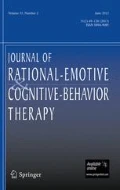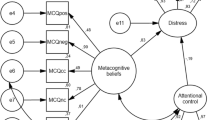Abstract
The current study aimed to test how metacognition relates to the concept of mindfulness attention awareness (MAA), whether metacognitions or MAA best predict symptoms of depression and anxiety, and whether there are significant differences between depression and anxiety levels due to metacognitions and MAA. Data were collected from a public sample through e-mails and social media platforms. The results showed that there was a moderate correlation between MAA and three of the five metacognitive subscales. Both MAA (r = 0.66) and metacognition (r = 0.64) were significantly correlated with depression and anxiety severity scores. Subjects in the depressed group ( r= 0.74) and anxious group (r = -0.47) endorsed metacognitions significantly more, and endorse MAA significantly less than did the nondepressed or nonanxious groups. Additionally, the results of the two-way ANOVA test revealed statistically significant effects for the depression level due to metacognitions (F = 99.802, p= 0.000) and MAA (F = 66.874, p = 0.000) in favor of total scores, as well as for the negative beliefs about the worry, cognitive confidence, and need for control factors. Regarding the level of anxiety, the results revealed significant differences between the anxious and not anxious groups due to the total score of MAA, while there were no differences for the cognitive self-consciousness factor or the overall average score of the metacognitive scale and its five factors upon anxious or not anxious groups. Moreover, the interaction results between depression and anxiety showed that there were significant differences for the negative beliefs about the worry, cognitive confidence, and need for control factors. Finally, regression analyses found metacognition to be an important predictor of symptoms explaining 52% for the depression, and 46% for the anxiety of the variance when controlling for age and gender, while mindfulness was a weaker predictor explaining 3% and 0% respectively of the variance.
Similar content being viewed by others
References
Aldahadha, B. (2019). Repeated negative thinking as a mediator of refraining from catastrophic thinking and neurotic responses. Psychiatry Psychotherapy and Clinical Psychology., 10(2), 181–240.
Aldahadha, B. (2018a). The psychometric properties of perfectionism scale and its relation to depression and anxiety. Cogent Psychology, 5(1), 1–13, https://doi.org/10.1080/23311908.2018.1524324
Aldahadha, B. (2018b). Disputing irrational beliefs among convicted terrorists and extremist beliefs. Journal of Rational-Emotive Cognitive-Behavior Therapy., 36(4), 404–416. https://doi.org/10.1007/s10942-018-0293-7.
Aldahadha, B. (2013). The effects of Muslim praying meditation and transcendental meditation programs on mindfulness among the University of Nizwa students. College Student Journal, 47(4), 668–677.
Al-Issa, I., Al Zubaidi, A., Bakal, D., & Fung, T. S. (2000). Beck anxiety inventory symptoms in Arab college students. Arab Journal of Psychiatry, 11(1), 41–47.
Al-Rumaih, M. (2001). Distinguish anxiety and depression using the cognitive and emotional models. Psychological Studies, 17(3), 519–545.
An-Nahar, T., & Zubaidi, A. (2000). Psychometric characteristics of the Arab image of the peak anxiety scale in the UAE environment, Qatar University. Journal of the Educational Research Center, 18, 78–106.
Argus, G., & Thompson, M. (2008). Perceived social problem solving, perfectionism, and mindful awareness in clinical depression: an exploratory study. Cognitive Therapy Research, 32, 745–757. https://doi.org/10.1007/s10608-006-9102-1.
Baer, R. A., Smith, G. T., Hopkins, J., Krietemeyer, J., & Toney, L. (2006). Using self-report assessment methods to explore facets of mindfulness. Assessment, 13, 27–45. https://doi.org/10.1177/1073191105283504.
Baer, R. A., Smith, G. T., Lykins, E., Button, D., Krietemeyer, J., Sauer, S., et al. (2008). Construct validity of the five facet mindfulness questionnaire in meditating and no meditating samples. Assessment, 15(3), 329–342.
Beck, A. T., & Steer, R. A. (1990). Manual for the Beck Anxiety Inventory. San Antonio: Psychological Corporation.
Beck, A. T., Steer, R. A., & Brown, G. K. (1996). BDI-II: Beck Depression Inventory (2nd ed.). San Antonio: The Psychological Corporation.
Bishop, S. R., Lau, M., Shapiro, S., Carlson, L., Anderson, N. D., Carmody, J., et al. (2004). Mindfulness: a proposed operational definition. Clinical Psychology Science and Practice, 11(3), 230–241. https://doi.org/10.1093/clipsy/bph077.
Bohlmeijer, E., Prenger, R., Taal, E., & Cuijpers, P. (2010). The effects of mindfulness-based stress reduction therapy on mental health of adults with a chronic medical disease: a meta-analysis. Journal of Psychosomatic Research, 68, 539–544. https://doi.org/10.1016/j.jpsychores.2009.10.005.
Brown, K. W., & Ryan, R. M. (2003). The benefits of being present: mindfulness and its role in psychological well-being. Journal of Personality and Social Psychology, 84, 822–848. https://doi.org/10.1037/0022-3514.84.4.822.
Cohen, J. (1988). Statistical Power Analysis for the Behavioral Sciences. Hillsdale, NJ: Erlbaum.
Cartwright-Hatton, S., & Wells, A. (1997). Beliefs about Worry and Intrusions: the Meta-cognitions questionnaire and its correlates. Journal of Anxiety Disorders, 11, 279–296. https://doi.org/10.1016/S0887-6185(97)00011-X.
Cash, M., & Whittingham, K. (2010). What facets of mindfulness contribute to psychological well-being and depressive, anxious, and stress-related symptomatology? Mindfulness, 1(3), 177–182. https://doi.org/10.1007/s12671-010-0023-4.
DiGiuseppe, R. (1999). End piece: reflections on the treatment of anger. Journal of Clinical Psychology, 55, 365–379.
Flavell, J. H. (1979). Metacognition and cognitive monitoring: a new area of cognitive-developmental inquiry. American Psychologist, 34, 906–911. https://doi.org/10.1037/0003-066X.34.10.906.
Halvorsen, M., Hagen, R., Hjemdal, O., Eriksen, M., Sørli, Å., Waterloo, K., et al. (2014). Metacognitions and thought control strategies in unipolar major depression: a comparison of currently depressed, previously depressed, and never depressed individuals. Cognitive Therapy and Research, 39, 31–40. https://doi.org/10.1007/s1060801496384.
Halvorsen, M., Wang, C. E., Richter, J., Myrland, I., Pedersen, S. K., Eisemann, M., et al. (2009). Early maladaptive schemas, temperament and character traits in clinically depressed and previously depressed subjects. Clinical Psychology & Psychotherapy, 16, 394–407. https://doi.org/10.1002/cpp.618.
Hamdi, N., Abu Hijleh, N., & Abu Talib, S. (2004). Factor structure and implications of validity and persistence of a localized image of Beck's list of depression. Journal of Studies (Educational Sciences), 15, 30–40.
Hofmann, S. G., Sawyer, A. T., Witt, A. A., & Oh, D. (2010). The effect of mindfulness-based therapy on anxiety and depression: a meta-analytic review. Journal of Consulting and Clinical Psychology, 78(2), 169–813. https://doi.org/10.1037/a0018555.
Jankowski, T., & Holas, P. (2014). Metacognitive model of mindfulness. Consciousness and cognition, 28, 64–80. https://doi.org/10.1016/j.concog.2014.06.005.
Kabat-Zinn, J. (1994). Mindfulness meditation for everyday life, London, UK.
Kabat-Zinn, J. (2003). Mindfulness-based interventions in context: past, present, and future. Clinical Psychology: Science and Practice, 10, 144–156.
Mathers, C. D., & Loncar, D. (2006). Projections of global mortality and burden of disease from 2002 to 2030. PLoS Medicine, 3, 2011–2030. https://doi.org/10.1371/journal.pmed.0030442.
Mueller, T., Leon, A. C., Keller, M. B., Solomon, D. A., Endicott, J., Coryell, W., et al. (1999). Recurrence after recovery from major depressive disorder during 15 years of observational follow-up. American Journal of Psychiatry, 156(7), 1000–1006.
Nelson, T. O. (1996). Consciousness and metacognition. American Psychologist, 51, 102–116. https://doi.org/10.1037/0003-066X.51.2.102.
Nelson, T. O., & Narens, L. (1994). Why investigate metacognition? In J. Metcalfe & A. P. Shimamura (Eds.), Metacognition (pp. 1–26). Cambridge: The MIT Press.
Normann, N., van Emmerik, A. A., & Morina, N. (2014). The efficacy of metacognitive therapy for anxiety and depression: a meta-analytic review. Depression and Anxiety, 31(5), 402–411. https://doi.org/10.1002/da.22273.
Papageorgiou, C., & Wells, A. (2001a). Positive beliefs about depressive rumination: development and preliminary validation of a self-report scale. Behavior Therapy, 32, 13–26. https://doi.org/10.1016/S0005-7894(01)80041-1.
Papageorgiou, C., & Wells, A. (2001). Metacognitive beliefs about rumination in recurrent major depression. Cognitive and Behavioral Practice, 8, 160–164. https://doi.org/10.1023/A:1023962332399.
Papageorgiou, C., & Wells, A. (2003). An empirical test of a clinical metacognitive model of rumination and depression. Cognitive Therapy and Research, 27, 261–273.
Papageorgiou, C., & Wells, A. (2009). A prospective test of the clinical metacognitive model of rumination and depression. International Journal of Cognitive Therapy, 2, 123–131. https://doi.org/10.1521/ijct.2009.2.2.123.
Park, T., Reilly-Spong, M., & Gross, C. R. (2013). Mindfulness: a systematic review of instruments to measure an emergent patient-reported outcome (PRO). Quality of Life Research, 22, 2639–2659. https://doi.org/10.1007/s11136-013-0395-8.
Philipp, R., Kriston, L., Kühne, F., Harter, M., & Meister, R. (2019). Concepts of metacognition in the treatment of patients with mental disorders. Journal of Rational-Emotive & Cognitive-Behavior Therapy. https://doi.org/10.1007/s10942-019-00333-3.
Piatkus Kikul, J., Van Allen, T. S., & Exner, C. (2012). Underlying mechanisms of verbal memory deficits in obsessive–compulsive disorder and major depression—the role of cognitive self-consciousness. Journal of Behavior Therapy and Experimental Psychiatry, 43(3), 863–870. https://doi.org/10.1016/j.jbtep.2011.12.009.
Segal, Z. V., Williams, J. M. G., & Teasdale, J. D. (2013). Mindfulness-based cognitive therapy for depression. New York: The Guilford Press.
Solem, S., Hagen, R., Wang, C., Hjemdal, O., Waterloo, K., Eisemann, M., et al. (2017). Metacognitions and mindfulness attention awareness in depression: a comparison of currently depressed, previously depressed and never depressed individuals. Clinical Psychology and Psychotherapy., 24, 94–102. https://doi.org/10.1002/cpp.1983.
Solem, S., Thunes, S. S., Hjemdal, O., Hagen, R., & Wells, A. (2015). A metacognitive perspective on mindfulness: an empirical investigation. BMC Psychology, 3, 24. https://doi.org/10.1186/s40359-015-0081-4.
Teasdale, J. D., Moore, R. G., Hayhurst, H., Pope, M., Williams, J. M., & Segal, Z. V. (2002). Metacognitive awareness and prevention of relapse in depression: empirical evidence. Journal of Consulting and Clinical Psychology, 70, 272–287. https://doi.org/10.1037//0022-006X.70.2.275.
Teasdale, J. D., Segal, Z. V., Williams, J. M. G., Ridgeway, V. A., Soulsby, J. M., & Lau, M. A. (2000). Prevention of relapse/recurrence in major depression by mindfulness-based cognitive therapy. Journal of Consulting and Clinical Psychology, 68, 615–623. https://doi.org/10.1037//0022-006X.68.4.615.
Van Dam, N. T., Hobkirk, A. L., Danoff-Burg, S., & Earleywine, M. (2012). Mind your words: positive and negative items create method effects on the five facet mindfulness questionnaire. Assessment, 19, 198–204. https://doi.org/10.1177/1073191112438743.
Wells, A. (2005). Detached mindfulness in cognitive therapy: a metacognitive analysis and ten techniques. Journal of Rational Emotive and Cognitive Behavior Therapy, 23, 337–355. https://doi.org/10.1007/s10942-005-0018-6.
Wells, A. (2009). Metacognitive therapy for anxiety and depression. New York: Guilford press.
Wells, A., & Cartwright-Hatton, S. (2004). A short form of the metacognitions questionnaire: properties of the MCQ-30. Behavior Research and Therapy, 42(4), 385–396. https://doi.org/10.1016/S0005-7967(03)00147-5.
Wells, A., & Matthews, G. (1994). Attention and emotion: a clinical perspective. Hove: Erlbaum (Psychology Press).
Wells, A., & Matthews, G. (1996). Modelling cognition in emotional disorder: The S-REF model. Behavior Research and Therapy, 34, 881–888.
Author information
Authors and Affiliations
Corresponding author
Ethics declarations
Conflict of interest
The author declare that there are no conflicts of interest in this research study.
Additional information
Publisher's Note
Springer Nature remains neutral with regard to jurisdictional claims in published maps and institutional affiliations.
Rights and permissions
About this article
Cite this article
Aldahadha, B. Metacognition, Mindfulness Attention Awareness, and Their Relationships with Depression and Anxiety. J Rat-Emo Cognitive-Behav Ther 39, 183–200 (2021). https://doi.org/10.1007/s10942-020-00367-y
Published:
Issue Date:
DOI: https://doi.org/10.1007/s10942-020-00367-y



